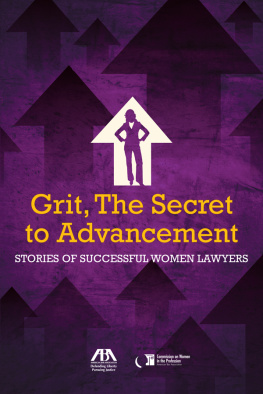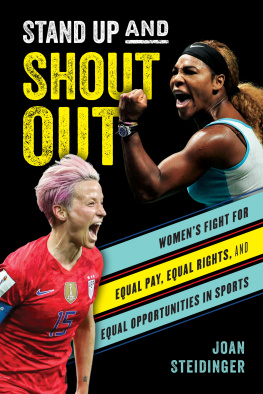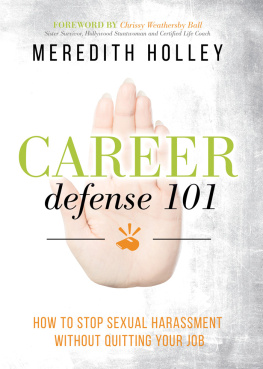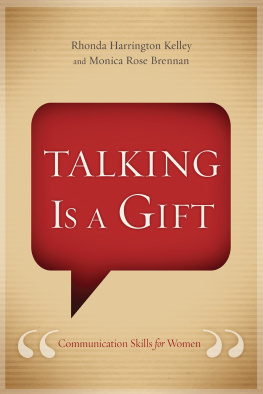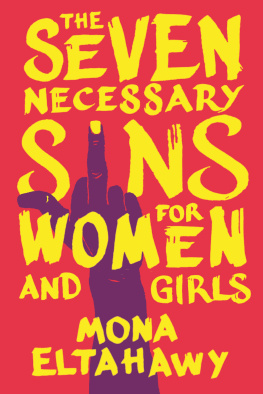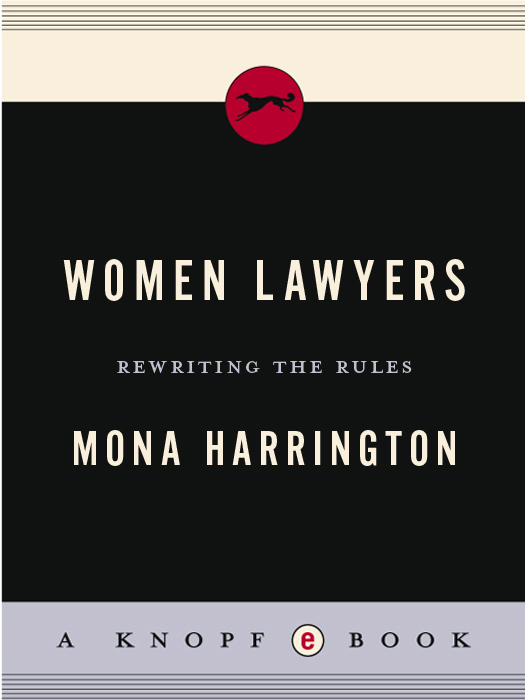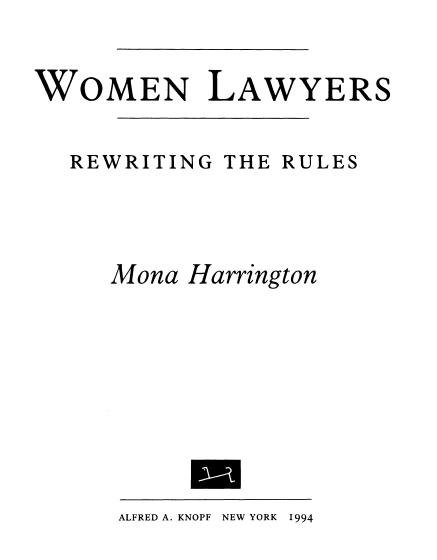ALSO BY MONA HARRINGTON
The Dream of Deliverance in
American Politics (1986)
Women of Academe:
Outsiders in the Sacred Grove
(with Nadya Aisenberg, 1988)

THIS IS A BORZOI BOOK
PUBLISHED BY ALFRED A. KNOPF, INC.

Copyright 1993 by Mona Harrington
All rights reserved under International and Pan-American Copyright Conventions. Published in the United States by Alfred A. Knopf, Inc., New York, and simultaneously in Canada by Random House of Canada Limited, Toronto. Distributed by Random House, Inc., New York.
Library of Congress Cataloging-in-Publication Data
Harrington, Mona, [date]
Women lawyers : rewriting the rules / Mona Harrington.
p. cm.
eISBN: 978-0-307-83156-9
1. Women lawyersUnited States.
KF299.W6H36 1994
349.73082dc20
[347.30082] 93-18000
v3.1
FOR ELIZA, BENJAMIN, AND THOMAS
questioners, critics, advocates
Acknowledgments
MY THANKS GO FIRST to the dozens of women lawyers who were willing to talk with a stranger asking deeply personal questions, and who answered with thoughtfulness and amazing frankness. I have enjoyed their openness and humor, admired their lack of pretense and their desire to get to the bottom of things even on subjects that were hard to face, and I have appreciated their graceful generosity with time.
I know that they will not always agree with my interpretations of what they have told me. One, in fact, raised the issue of my privileged role as interpreter. Who would and who should, she asked, analyze the content of the stories I was hearing? Had I considered organizing some post-interview process by which the interviewees could reflect on the material I had gathered and speak about its meaning? The questioner was a law professor strongly concerned with issues of voicemore specifically, with the exclusion from policy-making of the voices of powerless groups affected by policy. Her implication was that if I, alone, did the interpreting of the stories women told me, I would be joining the ranks of exclusionary authorities by appropriating to myself the authority to speak for othersappropriating the text, as literary critics call it. This was a disconcerting thought, as I had seen myself doing precisely the oppositegathering and publishing the stories of women whose voices were often not heard in a male-dominated profession. I worried about this question but decided that, as a practical matter, I could not organize rounds of self-interpretation by interviewees across the country. And finally, I concluded, I did not want to. I wanted to present the experience of a wide range of women lawyers by listening to them as attentively as I could, but I also wanted to speak myself about the relation of that experience to larger political questions.
Like my interviewees, I speak as a woman trained in the law, but, unlike most of them, as a woman who left the law for political science and who now speaks as a writer vitally involved with feminist issues and questions of equality generally in American politics and culture. This is the sensibility that frames my judgments about the stories I have heard. I have tried to make my voice clearly distinguishable from those of the women talking to me, and I hope that I have done justice to the multiplicity of views they have conveyed.
I also owe thanks beyond measure to all of those friends whose conversation is, for me, the medium that shapes ideas and sustains the spirit. To start at the beginning, Julia Budenz, the poet, convinced me to take on this project when it was proposed by Victoria Wilson, an astute editor at Knopf who knew that women lawyers were engaged in vital issues of wide-reaching significance. Nadya Aisenberg and Gillian Gill, indefatigable readers, helped me through the formative stages, Nadya supplying, throughout, illuminating connections between law and literature. Gillian provided patient instruction in French feminist theory when that became necessary and, with Russell Holmes and Lynda Boose, offered reflections on the psychology of fathers and daughters in the law. I hasten to add that none of these three is responsible for what I have finally said on that mysterious subject. Constance Buchanan helped to provide coherence to projections of a major revision, and also supplied trenchant commentary on the culture of powerful institutions. Ann Congleton, whose philosophic range extends from the ancient world to womens competitive sports, supplied close criticism of chapters on the mind/body split and on professional culture. Marguerite Bouvard, a poetpolitical scientist, read mounds of material and synthesized ideas in surprising language, a stream of small phrases that capture large meanings. Laura Meadows, my law school classmate and an early organizer of women lawyers networks, conducted a continuing tutorial on the practicalities of the profession. Margaret Miles applied the frozen-yogurt technique to several rough spots, urging that I talk through confusions and blockages to a sympathetic listener and questioner who knew the territory. Madeleine Kunin joined me in orgies of agonizing over the writers lot during her bookwriting year at the Bunting Institute.
By the end, Molly Shanley, acute analyst of womens legal issues, had read most chapters through two grueling drafts and had scoured the final manuscript line by line, an act of true friendship. Jane Garrett, my editor, had provided staunch support, cheerful confidence, and wise guidance at every step along the way. And Paul Gagnon had listened to travails, pored over language, and seen me through yet another intellectual venture.
Contents
Introduction
N O -M AN S -L AND
THE OLD ORDER OF THE SEXES is breaking apart, not quickly, not neatly, not logically according to some carefully phased program. It is breaking, as complicated social systems do, at points of particular pressure. Fissures appear in some places while other parts remain intact and yet others are in flux with old and new rules both operating, in uneasy tension.
The pressure comes from the surge of democratization that since the 1960s has been building and working change in arrangements of power throughout the society. Starting with the civil rights movement, groups outside the established circles of authority began to raise in new terms the old American issue of equality. The old measure of equality was the right to vote and to enjoy equal legal rights generally. The new measure is inclusion in all the places and institutions where people actually make the decisions that shape the way we live. What we are about now, outsiders and insiders both, is nothing less than the renegotiation of our entire social contract.
In the present system, insiders hold effective power to rule the country within a structure of overlapping elitesgovernmental, corporate, professional. Members of these elites run our corporations, banks, schools, universities, law firms, churches, farms, armed forces, medical and psychiatric institutions, science labs, news media, publishing houses, sports, arts, and entertainment, as well as our governments from the local to the national level.


